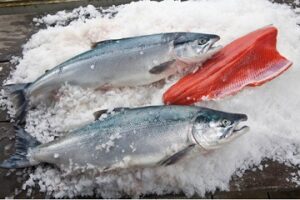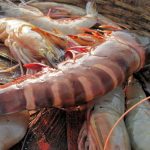Tag Archives: Maine lobster industry
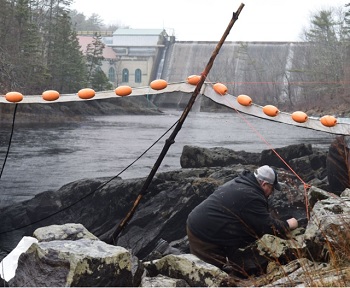
Maine: Elver price plummets; lobster industry seeks help
Earning a living as a fisherman is tough in the best of times. Right now, times are bad and Maine fishermen have to hope they don’t get any worse.
Last year, according to the Department of Marine Resources, Maine harvesters landed 9,620 pounds of elvers, juvenile eels, and dealers paid $20,119,194 for the catch, an average price of $2,091 per pound for the fishermen. Things are markedly different in this year of the coronavirus pandemic.,, Like elver harvesters, members of Maine’s lobster industry have experienced an extraordinary disruption of their fishery. Most lobsters are consumed in restaurants or other commercial settings,,, >click to read< 16:30
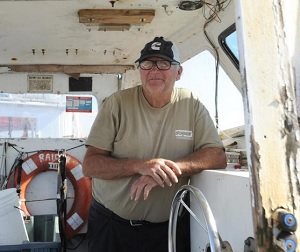
Truro lobsterman says rules to protect right whales costly to his business
Cheryl Souza is ending her lobster sales after October. But third-generation lobsterman Billy Souza, as it turns out, is considering quitting as well. “It’s all the whale issues,” Souza said. Unlike the lobstering in the days of Souza’s grandfather, Frank Souza, and his father, William Souza, the current generation fishing off Cape Cod is under an intense and unique scrutiny..,, “The whales could get entangled anywhere in the world, but there’s so many eyes on them here it looks like we’re the bad guys and we’re not.” >click to read< 07:38

MLA Decision Disappoints, NOAA will continue to work with the Maine lobster industry
Although the Maine lobster industry formally withdrew its support of the near consensus agreement, members of the Maine caucus have stated a willingness to continue to work with the agency, the Take Reduction Team, the state of Maine, and their members to identify measures that address the risk that the Maine lobster fishery poses to right whales. We stand ready to continue to assist Maine in whatever way possible to achieve the necessary level of risk reduction to these critically endangered whales.,, >click to read< 13:27
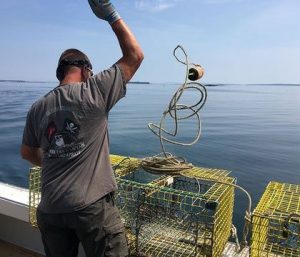
Changing climate boosts Maine lobster industry — for now
Maine’s lobster industry has found itself in something of a climate change sweet spot. The state’s coastal waters are still cold enough for lobster to thrive, but warming ocean temperatures are now encouraging them to settle here, mate and eventually shed their hard shells.,,, “Maine has enjoyed this abundant, expanding resource but everything that comes up must come down, and that is very related to climate change because that is very related to water temperature,” said Genevieve McDonald, a lobsterman and Stonington’s new representative in the Maine Legislature. >click to read< 16:44

Maine turns to Canada after losing China lobster market
The Maine lobster industry is switching to other markets – as far away as Thailand and Vietnam and as close as Canada. Maine-based lobster companies are opening operations in Canada and shipping lobsters from Nova Scotia because Canada isn’t affected by the US-China trade dispute. That reflects what Bill Bruns, operations manager of The Lobster Co in Arundel, has seen in his own export business. As a result, trade in lobsters from Canada is booming.,,, Ready Seafood of Portland, Maine, last fall acquired L. Walker Seafoods, >click to read<13:24
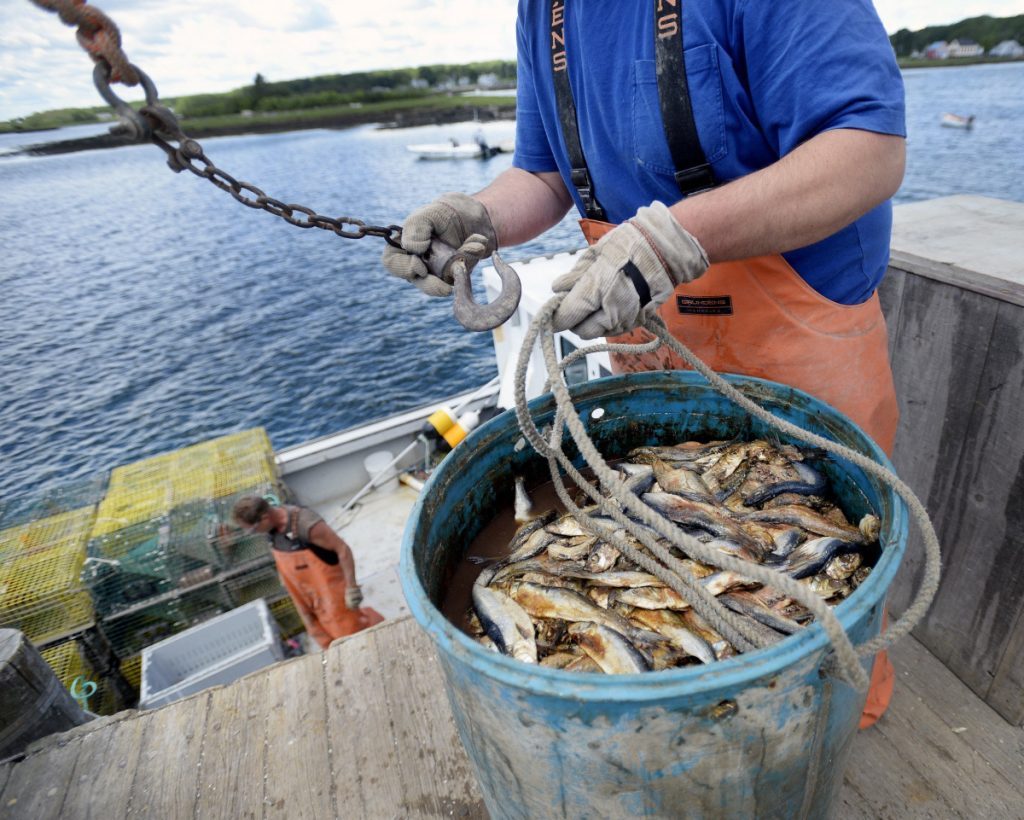
Maine: Pending bait shortage poses another threat to New England lobster industry
Regulators want to cap this year’s herring landings at last year’s levels, or 50,000 metric tons, and slash next year’s quota of the most popular lobster bait from 110,000 to 30,000 metric tons. They want to do this to offset record low numbers of newborn herring that are entering the fishery to replace those that are caught, eaten by other predators or die from natural causes. The 2019 quota could fall even lower if regulators adopt a separate proposal to leave more herring in the sea to feed the fish, birds and marine mammals that eat them, including Gulf of Maine species such as cunner, cod, seals, whales, puffins and terns. The New England Fishery Management Council could decide the issue as early as September. Eco-based Management. >click to read<10:51
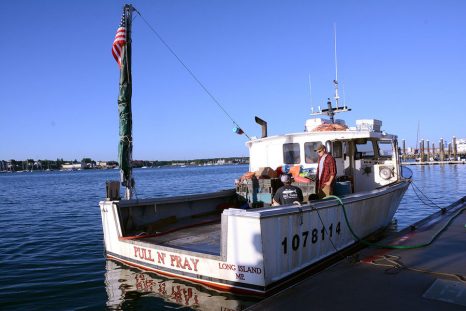
For Maine lobstermen, conservation and success go hand in hand
It’s 7 a.m. on the Pull n’ Pray. The lobster boat rocks over large swells as the water sparkles in the June morning sun. The grating whirr of the hydraulic winch drowns out the hum of the boat’s motor as it lifts the first lobster trap of the day out of the water. Justin Papkee swings the trap up onto the side of his boat and quickly opens the latch. Suddenly there are lobsters flying through the air. Mr. Papkee’s blue rubber gloved hand is nearly a blur as he reaches again and again into the open trap, tossing the lobsters back into the water rapid-fire before pulling in the next trap. >click to read<12:28

Maine lobster industry braces for impact of Canada’s sweet EU deal
More than 1,700 fishing boats raced out of Nova Scotia ports before first light Tuesday morning on what is known as Dumping Day – the opening of Canada’s biggest and most lucrative lobster fishery. It also signals the start of when their U.S. rivals in Maine and Massachusetts will begin to feel the sting of the 8 percent tariff differential created when Canada signed a new trade deal with Europe, leaving American lobstermen to wonder just how much of that valuable market they are about to lose. click here to read the story 07:51
Sept. 25th – Celebrating The Iconic Maine Lobster Industry On National Lobster Day
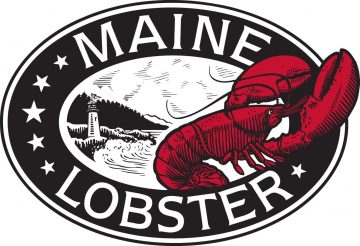 For the third year in a row the Maine Lobster industry is gearing up to celebrate National Lobster Day on September 25th. Maine Lobster is an American icon that has been enjoyed by diners across the world for centuries.,, “Most people don’t know that the best time to enjoy a Maine Lobster is during late summer and fall, which is why we celebrate National Lobster Day on September 25th,” said Dave Cousens, Maine Lobsterman. “It’s important to us that we bring attention to our industry during the time when our catch is at its highest.” click here to read the story 14:17
For the third year in a row the Maine Lobster industry is gearing up to celebrate National Lobster Day on September 25th. Maine Lobster is an American icon that has been enjoyed by diners across the world for centuries.,, “Most people don’t know that the best time to enjoy a Maine Lobster is during late summer and fall, which is why we celebrate National Lobster Day on September 25th,” said Dave Cousens, Maine Lobsterman. “It’s important to us that we bring attention to our industry during the time when our catch is at its highest.” click here to read the story 14:17
Opioid Crisis Taking Toll On Maine Lobster Industry
 The nation’s opioid crisis has hit hard in Maine, where at least one person died every day last year of drug overdoses. It’s also penetrated the state’s lobster industry. Some fishermen are suffering in silence in a community that rarely asks for help. Josh Kane has spent more than 15 years fishing off the coast of Maine. For 10 of those years, he struggled with an opioid addiction as his fellow lobstermen looked the other way. In Washington County, economic leaders say the impact of the opioid epidemic on the lobster industry could easily affect an entire generation. “If you look around a coastal town, you have a sense of the value of the catch coming in,” Rudelitch said. “That new roof, that investment that should have come from a series of good years, just isn’t.” click here to read the story 15:16
The nation’s opioid crisis has hit hard in Maine, where at least one person died every day last year of drug overdoses. It’s also penetrated the state’s lobster industry. Some fishermen are suffering in silence in a community that rarely asks for help. Josh Kane has spent more than 15 years fishing off the coast of Maine. For 10 of those years, he struggled with an opioid addiction as his fellow lobstermen looked the other way. In Washington County, economic leaders say the impact of the opioid epidemic on the lobster industry could easily affect an entire generation. “If you look around a coastal town, you have a sense of the value of the catch coming in,” Rudelitch said. “That new roof, that investment that should have come from a series of good years, just isn’t.” click here to read the story 15:16
Trade Deals: Maine Lobster industry fears lost sales from ramped-up Canadian exports
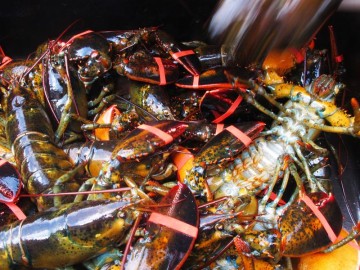 A new trade deal looming between Canada and the European Union is setting off alarm bells in the Maine lobster industry. The deal between Canada and the EU – the largest seafood consumer market in the world – would eliminate tariffs on Canadian lobster exports into Europe and give the Maritimes a competitive advantage over their American counterparts, who would be stuck selling lobsters with tariffs ranging from 8 percent for a live lobster to 20 percent on processed or cooked lobster. A weak Canadian dollar, which is now valued at about 75 percent of a U.S. dollar, will only make Canadian lobster that much more attractive to importers in the 28 member nations of the European Union, which is the second biggest importer of American lobsters, second only to Canada, according to trade data. In 2016, the EU imported $152 million worth of lobsters from the U.S., most of it from Maine. continue reading the story here 08:07
A new trade deal looming between Canada and the European Union is setting off alarm bells in the Maine lobster industry. The deal between Canada and the EU – the largest seafood consumer market in the world – would eliminate tariffs on Canadian lobster exports into Europe and give the Maritimes a competitive advantage over their American counterparts, who would be stuck selling lobsters with tariffs ranging from 8 percent for a live lobster to 20 percent on processed or cooked lobster. A weak Canadian dollar, which is now valued at about 75 percent of a U.S. dollar, will only make Canadian lobster that much more attractive to importers in the 28 member nations of the European Union, which is the second biggest importer of American lobsters, second only to Canada, according to trade data. In 2016, the EU imported $152 million worth of lobsters from the U.S., most of it from Maine. continue reading the story here 08:07
Maine lobstermen’s group weighs in on death of entangled whale
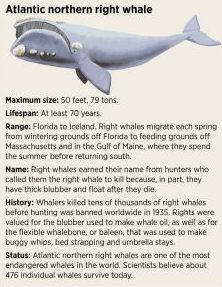 There are signs the ropes were from fishing gear not used for lobstering, an official says, as others discuss regulations that protect the endangered animal. The death of a 45-ton right whale found entangled in fishing line about 12 miles off the Maine coast over the weekend has caught the attention of the Maine lobster industry even though it’s not clear whether the whale’s demise was related to lobster fishing. The right whale is endangered and protected by the federal government. Patrice McCarron, executive director of the Maine Lobstermen’s Association, said preliminary indications appear to show that the ropes found on the whale were much larger than those typically used by lobstermen. The larger ropes would instead more often be found in deep-sea fishing, she said. Read the story here 17:18
There are signs the ropes were from fishing gear not used for lobstering, an official says, as others discuss regulations that protect the endangered animal. The death of a 45-ton right whale found entangled in fishing line about 12 miles off the Maine coast over the weekend has caught the attention of the Maine lobster industry even though it’s not clear whether the whale’s demise was related to lobster fishing. The right whale is endangered and protected by the federal government. Patrice McCarron, executive director of the Maine Lobstermen’s Association, said preliminary indications appear to show that the ropes found on the whale were much larger than those typically used by lobstermen. The larger ropes would instead more often be found in deep-sea fishing, she said. Read the story here 17:18
Maine lobster industry wary as warm waters suggest repeat of disastrous 2012 season
 For those in the lobster industry, any sign of a return to the conditions of 2012 is cause for high anxiety. Researchers say the industry needs to be prepared for that possibility because warming trends are laying the groundwork for a potential repeat of the disastrous season of four years ago. “We learned a hard lesson in 2012,” said Patrice McCarron, executive director of the Maine Lobstermen’s Association. Because of warm waters in the Gulf of Maine, peak harvesting started in May that year, weeks ahead of schedule. The catch jumped more than 20 percent, from 104 million pounds in 2011 to 127 million pounds in 2012. The shedding season,,, Read the article here 10:29
For those in the lobster industry, any sign of a return to the conditions of 2012 is cause for high anxiety. Researchers say the industry needs to be prepared for that possibility because warming trends are laying the groundwork for a potential repeat of the disastrous season of four years ago. “We learned a hard lesson in 2012,” said Patrice McCarron, executive director of the Maine Lobstermen’s Association. Because of warm waters in the Gulf of Maine, peak harvesting started in May that year, weeks ahead of schedule. The catch jumped more than 20 percent, from 104 million pounds in 2011 to 127 million pounds in 2012. The shedding season,,, Read the article here 10:29
The enigma behind America’s freak, 20-year lobster boom
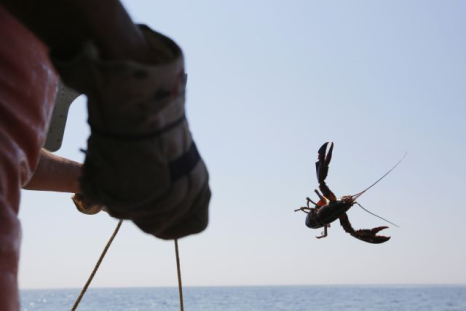 Even as biologists puzzle over Maine’s strange serendipity, a more ominous mystery is emerging. A scientist who tracks baby lobsters reports that in the last few years their numbers have abruptly plummeted, up and down Maine’s coast. With the number of breeding lobsters at an all-time high, it’s unclear why the baby lobster population would be cratering—let alone what it portends. It could reflect a benign shift in baby lobster habitats. Or it could be that the two-decade boom is already on its way to a bust. To form a clearer picture why, we first need to unravel the possible causes of the current lobster glut. Read the rest here 09:23
Even as biologists puzzle over Maine’s strange serendipity, a more ominous mystery is emerging. A scientist who tracks baby lobsters reports that in the last few years their numbers have abruptly plummeted, up and down Maine’s coast. With the number of breeding lobsters at an all-time high, it’s unclear why the baby lobster population would be cratering—let alone what it portends. It could reflect a benign shift in baby lobster habitats. Or it could be that the two-decade boom is already on its way to a bust. To form a clearer picture why, we first need to unravel the possible causes of the current lobster glut. Read the rest here 09:23
Maine lobster industry – Long winter boosts lobster prices
The unusually cold winter may finally be over, but the 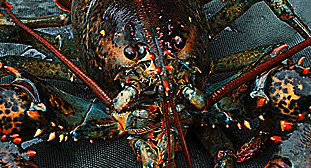 is still feeling its effects. The current wholesale market price of lobster is up to an average of $9 a pound, even higher in some places. Those high prices could last into the midsummer season before soft shell lobsters hit the menu. “The water temperature right now is 38, last year at this time it was around 42, 43. So we’re behind in the temperature. We might make it up if the spring gets a lot warmer, we might get caught up,” said sale manager of Beal’s Lobster Pier in Southwest Harbor, Rob Bauer. Read the rest here
is still feeling its effects. The current wholesale market price of lobster is up to an average of $9 a pound, even higher in some places. Those high prices could last into the midsummer season before soft shell lobsters hit the menu. “The water temperature right now is 38, last year at this time it was around 42, 43. So we’re behind in the temperature. We might make it up if the spring gets a lot warmer, we might get caught up,” said sale manager of Beal’s Lobster Pier in Southwest Harbor, Rob Bauer. Read the rest here
Maine Lobster industry grateful for ‘normal’ summer
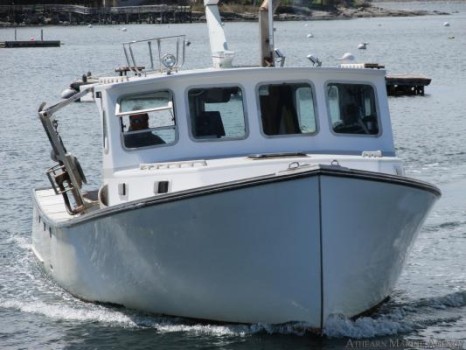 If there is anything commercial fishermen in Maine have learned over the past several years, it is that things aren’t the way they used to be. Dean Crosman, owner of Little River Lobster Co. in Cutler, said landings have intensified in recent weeks. He agreed with Carver, saying cold water temperatures this spring led to the later molt and have helped keep prices afloat. Read the rest here 07:23
If there is anything commercial fishermen in Maine have learned over the past several years, it is that things aren’t the way they used to be. Dean Crosman, owner of Little River Lobster Co. in Cutler, said landings have intensified in recent weeks. He agreed with Carver, saying cold water temperatures this spring led to the later molt and have helped keep prices afloat. Read the rest here 07:23
Maine lobster industry encouraged to plan ahead for likely fishery decline
 Patrick Keliher, commissioner of the Maine Department of Marine Resources, stressed that message Tuesday to a few dozen lobstermen and other people who attended an industry meeting at the local Neighborhood House. Read more here 07:29
Patrick Keliher, commissioner of the Maine Department of Marine Resources, stressed that message Tuesday to a few dozen lobstermen and other people who attended an industry meeting at the local Neighborhood House. Read more here 07:29
Maine Lobster Industry Transitions As Lobster Harvesting Continues to Surge
 Mark Murrell of GetMaineLobster.com discusses the Maine lobster industry and improvements he and others in his line of work believe should be made to processing facilities and marketing campaigns in the state. [email protected] 11:48
Mark Murrell of GetMaineLobster.com discusses the Maine lobster industry and improvements he and others in his line of work believe should be made to processing facilities and marketing campaigns in the state. [email protected] 11:48
Letters to the editor – New fee will add to lobstermen’s woes, lobsterman Nelson King, East Boothbay
A recent article (“Maine lobster industry supports new fee,” March 6) is incorrect. The article states that the majority of lobstermen are in favor of L.D. 486 and L.D.182, requiring lobstermen to pay 74 percent of the Lobster Promotion Council’s budget increase. They are not. continued![]()




































